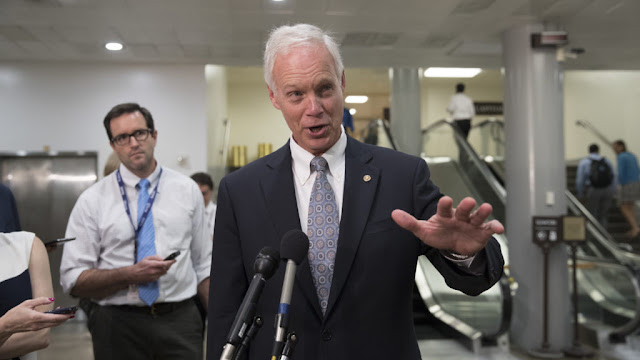Tinfoil hatters vindicated? "The Big Memo" may be only the beginning.
 |
| Senator Ron Johnson (R-Wisc), chairman of the Senate Homeland Security |
Even with the release of the memo, we may only see the tip of the iceberg. We must get to the bottom of the corrupt and treacherous leadership in our agencies whose missions are the protection of American citizens.
Johnson Widens his Probe
By Julie Kelly| February 1, 2018For most of last week, Senator Ron Johnson (R-Wisc), chairman of the Senate Homeland Security
committee, was mocked for talking to the press about a “secret society” at the FBI. The media, Democrats, and some NeverTrumpers on the Right accused the senator of pushing conspiracy theories based on what they called a “joke” contained in a text between two Bureau lovebirds, Peter Strzok and Lisa Page, the day after Donald Trump won the presidency. Even though Johnson also said his committee has an informant who verified off-site meetings of FBI officials taking place in late 2016 and early 2017, the media’s portrayal of the senator as a tinfoil hat-wearing conspiracist took off nonetheless.
Well, Johnson might get the last laugh: He is now widening the search of communications from top FBI officials, including former director James Comey, as well as demanding emails sent between President Barack Obama and Hillary Clinton when the then-Secretary of State was in Russia. Johnson sent a letter to Deputy Attorney General Rod Rosenstein this morning, asking for “additional communications including texts, emails, memos, and voicemails relating to the FBI’s investigation of former Secretary of State Hillary Clinton, and candidates for the 2016 presidential election for 16 F.B.I. and DOJ officials.” The committee also wants the calendars of those officials from January 2015 until now. (It did not say whether the committee would accept Putin-themed calendars.)
When he expressed more frustrations to Page about the investigation—“I’m not sure if I want to be part of this”—Page reassures him that he has “every right to be angry and frustrated about being left out of the loop on your investigation, especially when you’re going to be left holding the bag.” Johnson wrote in the letter that while “it is unclear whether Mr. Strzok’s frustration was related to the President’s comments, the timing of the communication raises questions about the FBI’s handling of the Clinton email server investigation.”
The committee’s investigation has already uncovered evidence that the original draft of Comey’s July 5, 2016 statement refusing to recommend charges against Clinton was revised several times. According to reports, an early draft of Comey’s statement indicated Clinton “used her personal email extensively while outside the United States, including from the territory of sophisticated adversaries. That use included an email exchange with the President while Secretary Clinton was on the territory of such an adversary.” A subsequent edit replaced “President” with “senior government official.” (Other edits included swapping “grossly negligent” with “extremely careless” and downgrading an original assessment it was “reasonably likely” that hostile actors accessed Clinton’s email server to it was “possible.”) Further, according to National Review Online’s Andrew McCarthy, “Obama had his email communications with Clinton sealed. He did this by invoking a dubious presidential-records privilege.”
In addition, any texts, emails, voicemails, or instant messages sent by the 16 FBI officials that refer to the “FBI’s Midyear Exam investigation, the presence of classified information on Secretary of State Clinton’s private email server, or candidates for the 2016 presidential election for the following custodians” must be turned over to the committee. Johnson wants to know whether any of these employees had similar “software glitches” with their devices that allegedly resulted in the failure to retain five months of text message between Strzok and Page. (The Inspector General has informed the committee that those texts will be recovered.) Amid chatter between Strzok and Page that the bureau might have considered issuing iPhones—Strzok asks about “[getting] around our security/monitoring issues”—Johnson is also asking if anyone working on the Midyear exam received an iPhone.
Could this be the group that Page referred to as the “secret society?” A committee spokeswoman told me the list was expanded to include people who worked on the Midyear exam, but why ask for calendars, particularly for a timeline way beyond the end of the Clinton email investigation? Is the committee looking for overlap in their schedules that might confirm off-site meetings?
As we await the release of the Nunes memo, Johnson’s latest inquiry is a reminder that, no matter what’s contained in that memo, we are still a long way off from getting to the bottom of this scandal. We think we know the answers and the players, but we do not. As bad as it looks now, it could get much worse.



Comments
Post a Comment